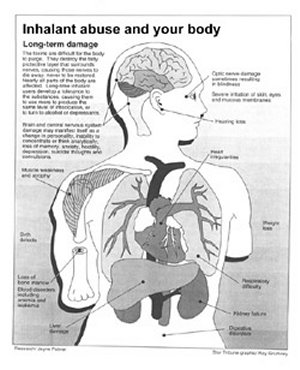| Introduction
| Principles | Innovation
| History | What
is Inhalant Abuse?
Background:
Introduction

|
|
Click on picture for a larger view
|
The goal of The New England Inhalant Abuse Prevention Coalition is to reduce inhalant abuse by creating statewide inhalant task forces or teams. The mission of these teams and task forces is to tweak their state's prevention system to be more effective in addressing inhalant abuse. The role of the Coalition is to provide technical assistance reflecting state-of-the-art inhalant prevention materials and strategies based on a consensus of national experts.
This website documents our approach and the two paradigms that were incorporated into this project.
An infrastructure approach
First, the grant focused on enhancing the prevention infrastructure and developing ongoing mechanisms that would persist beyond the life of the grant. No direct services were provided. Instead we used established organizations to targeted youth-serving professionals who already had a role in prevention and supplied them with the information, resources, and strategies to prevent inhalant abuse. We tapped into existing networks using a "diffusion of innovation" model to disseminate.
A poisons approach
Secondly, we view inhalants as poisons, pollutants, toxins, and fire and explosion hazards instead of focusing on their drug-like effects. This was done to avoid encouraging na´ve children to experiment with products that could cause death on first use. Based on a consensus of best practices by national experts, the poisons message was integrated into trainings, media campaigns, online parent trainings, regional and state task forces, and materials development and distribution.
Inhalant abuse is the purposeful inhalation of gases and vapors with the intention of achieving a drug-like effect. Inhalants, more than any other drug, are readily available to children, and can be deadly on first use. Like other drugs, they are addictive. And like alcohol and cigarettes, they are an entry into the world of drug abuse for many children.
However, inhalants are also different from other drugs. Inhalants, because they are common household and school products, are readily available to children and can be deadly on first use. Inhalants are also poisons, pollutants, and fire hazards, and education about inhalants should stress this, and emphasizing a product and fire safety and poison awareness approach. When targeting young children who know little or nothing about inhalants, we avoid teaching that inhalants create euphoria, thereby giving them an easily accessible and cheap way to get "high." For older children, who already view inhalants as a drug, it is important to add these new messages to our prevention approaches.
Goals
The
goal of the project is to bring key state agency people and community
based people together in each of the six New England states to develop
an understanding of the inhalant problem and a comprehensive response
to it. This was accomplished through establishing of an ongoing
mechanism for dissemination of inhalant use prevention best practices
that would tap into existing networks and communication channels
using a “diffusion of innovation” model.
|
